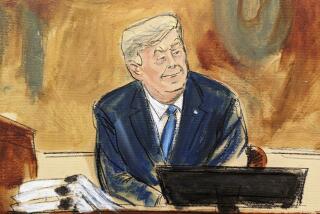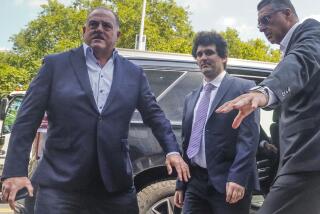Broadsides Open Trial of Stewart
- Share via
NEW YORK — The government attacked Martha Stewart as a liar Tuesday, and her lawyer fired back by accusing the government of smearing the lifestyles tycoon with false leaks and then prosecuting her just for defending herself.
The broadsides came during opening arguments in the fraud and obstruction-of-justice trial of Stewart and her former stockbroker, Peter Bacanovic, delivered in the packed courtroom of U.S. District Judge Miriam Goldman Cedarbaum.
Stewart and Bacanovic, with family members and friends in the audience nearby, listened with grim expressions as lead prosecutor Karen Patten Seymour laid out the government’s case to the jury of eight women and four men.
The charges arose from Stewart’s Dec. 27, 2001, sale of nearly 4,000 shares of stock in ImClone Systems Inc., the biotech firm then headed by her friend Samuel D. Waksal. Stewart’s stock sale came a day before a regulatory ruling sank ImClone shares.
Seymour told the jury that Stewart sold because Bacanovic, in violation of confidentiality rules, gave her a tip that Waksal was “desperately” trying to dump his stock. Waksal and his family quickly came under investigation for shedding their stock, and the probe spread to others who had sold ImClone stock that day, including Stewart.
Stewart and Bacanovic concocted a phony story that they had previously agreed to sell the ImClone shares when the price fell to $60, as it did that day, Seymour said.
After lying to investigators, Stewart later “multiplied that lie by feeding it to investors in her company,” Martha Stewart Living Omnimedia Inc., Seymour said.
Her motive, the prosecutor said, was to save her reputation, which she knew was central to the success of her company, where most of her half-billion-dollar wealth resided. A scandal could batter the company stock.
“Martha Stewart knew full well that her fortune was threatened,” Seymour said. For each dollar drop in her company’s shares, she added, Stewart’s personal stake fell $30 million.
Robert G. Morvillo, Stewart’s lead defense lawyer, countered that the prosecution’s case amounted to “speculation, surmise and guesswork.”
He said the government has no direct evidence that Bacanovic and Stewart concocted their story or that they even spoke with each other from the time of the stock sale to Jan. 7, 2002, when Bacanovic first told investigators of their prior agreement.
Morvillo scorned members of Congress who leaked information to the media in June 2002 that Stewart had received a “sell” tip from Waksal.
Prosecutors now concede that there was no tip from Waksal to Stewart.
But after Stewart denied those accusations and repeated her claim about the agreement to sell at $60, she was charged with securities fraud for trying to mislead investors.
“Same government: Leak it on one side, prosecute on the other. Great system. I think George Orwell was just about 20 years too early,” Morvillo said, referring to the author of “1984.”
Bacanovic attorney Richard M. Strassberg described extensive contacts between Stewart and Bacanovic in the fall of 2001 during which they planned the sales of a number of stock holdings.
More to Read
Inside the business of entertainment
The Wide Shot brings you news, analysis and insights on everything from streaming wars to production — and what it all means for the future.
You may occasionally receive promotional content from the Los Angeles Times.










